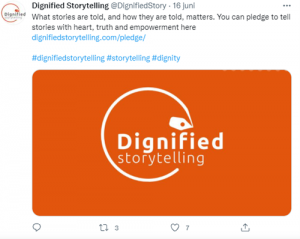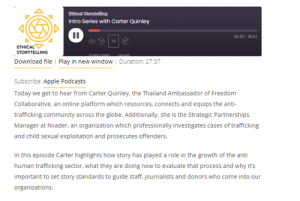As a communications officer within the development sector, and a student within Communication for Development (ComDev), I struggle with the gap relating to postcolonial awareness that I often feel exists between academics and practitioners. We have a lot of research and articles stating what type of communication that can be harmful and that creates stereotypes. Despite this, practitioners in funding departments too often continue to create exploiting and stereotypic campaigns of people in poverty. Why is it so?
Storytelling is an important tool in communication to personalize content, and make facts, statistics, reports, and numbers more real, urgent, and affectionate, and ICT enables us to tell stories and advocate in new ways. But if stories are told on behalf of the people who is supposed to be strengthened, is this really a sustainable way to work in the long run?
“When we reduce a person’s story into a simple ‘they were in this super traumatic experience and now they’re free and everything’s great’ — it doesn’t tell the whole story. ” — MADELINE KRONENBERG, DRESSEMBER COMMUNICATIONS MANAGER
Perhaps you can relate to the difficult controversies and paradoxes attached to, on the one hand engaging donors in funding campaigns, and on the other one fighting for an ethical communication that raises awareness and advocates for rights? The digital development of new technology and social platforms enables us to meet in new arenas, and digital funding results in more dilemmas when the donors and recipients share the same forums, comment sections and digital content. The global migration flows also means that the classic geographic division between donors in the north and recipients in the south has changed.
Often, I find it easier to be critical to what is not the right way to do things, and discuss what it problematic, than to find new ways to do it better. I meet colleagues at work, in networks and other organizations that struggle with the same question. So how do we do it right? Of course, there are no perfect solutions. But we cannot stop trying.
Internet’s effects on storytelling
The Internet and digitalization have also made this question more complex in a lot of aspects. For example, how long can an organization continue to tell a person’s story? For how long does a girl who has been trafficked want her story to be shared? Maybe it is something in her past she wants to move on from and forget, but when you search for her name, it is still there. Or maybe she is back in trafficking again, and the success story is no longer so bright.
The new GDPR legislation within the European Union states that one can only keep a person’s data for a certain period, to protect people’s personal data. But do development organizations apply this for people living outside the union? Or do Western NGOs and institutions apply a postcolonial way of working, based on the unequal legal terms, where there are different rules depending on the person’s address?
New tools for practitioners to change the way we tell stories
Last week I was listening to a refreshing seminar at my MA course (ComDev), at Malmö University held by the initiative Dignified Storytelling Alliance . They are promoting a new standard for storytelling in humanitarian and development communication. A way for practitioners to gain knowledge on why it matters how we collect and tell stories, but also get access to tools on how to do better.

– https://twitter.com/dignifiedstory
I hope the project they presented will contribute to create a new standard for the development sector globally to work with dignifying storytelling.
Another helpful tool on the same topic I can recommend is a Podcast episode, from Ethical Storytelling with Carter Quinley, the Thailand Ambassador of Freedom Collaborative, on how one can integrate ethical storytelling in the organization’s everyday work.

In my coming posts here on the blog, I will share my thoughts and examples from different actors on how we can change our narratives in digital development. Looking forward to hearing your experiences and views on this! Do you see a need for better tools and best practice examples on how to make the storytelling more ethical?
/Cecilia


